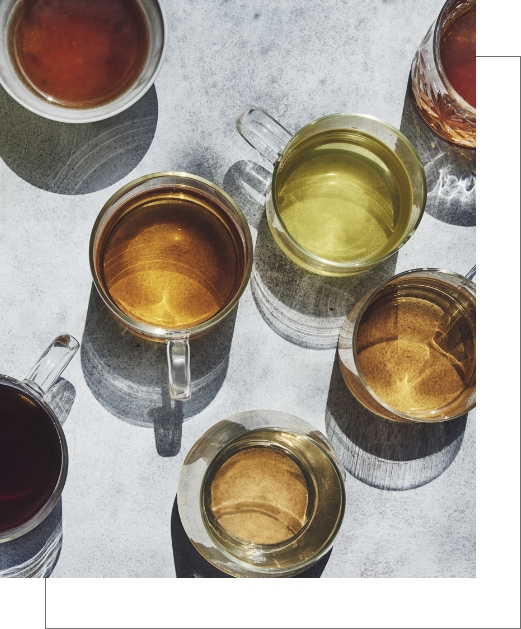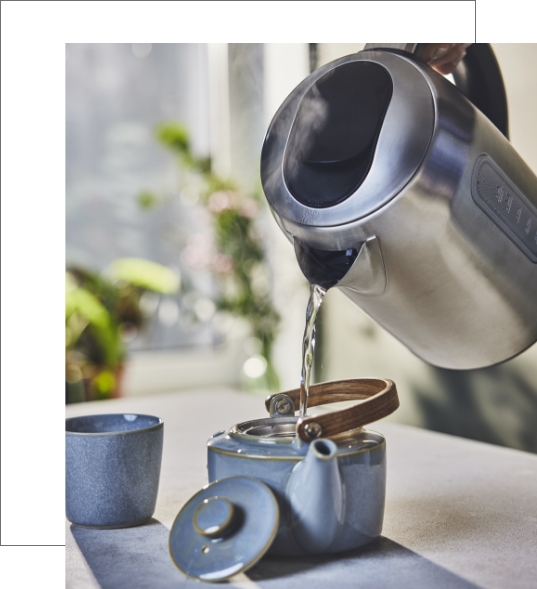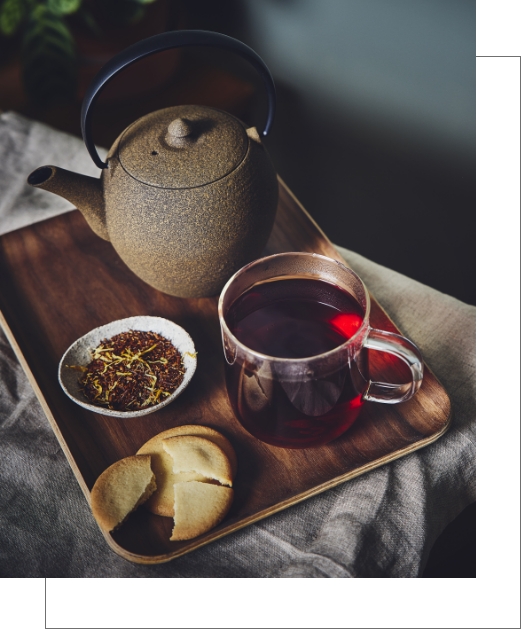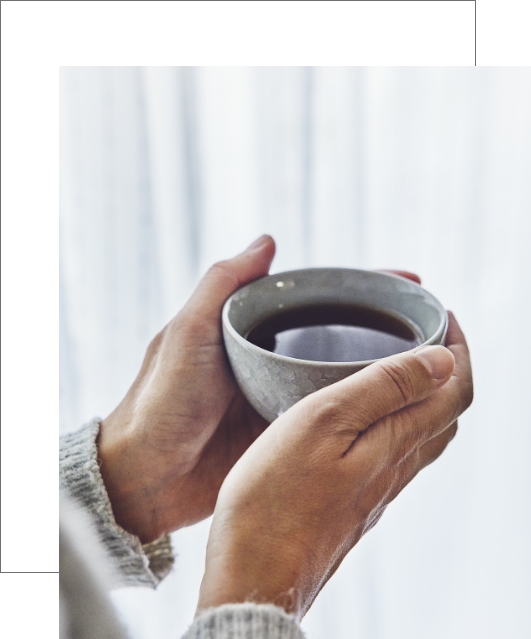Free shipping from $55
What is an infusion?
Typically crafted from blends of dried herbs, fruits, or flowers, infusions are healthy and caffeine-free beverages. They can be enjoyed hot or cold, at any time of the day. Infusions usually do not contain stimulants, making them an excellent choice for the entire family. These herbal concoctions can can be purchased in loose leaf or tea bags. Cotton bags, untreated with chlorine, are typically the most recommended option. Opting for organic infusions and herbal teas is also advised to minimize exposure to potentially harmful substances like pesticides.

What is the difference between an infusion and an herbal tea?
It all boils down to the preparation method: infusion is the result of an... infusion! Meanwhile, a herbal tea can also arise from methods like maceration or decoction. In essence, an infusion qualifies as a herbal tea, but not all herbal teas necessarily come from infusion. Nevertheless, the term "infusion" has become widely used and frequently denotes any caffeine-free plant or plant blend that serves as the foundation for a hot or cold beverage.
What is the difference between an infusion and tea?
Tea is crafted from Camellia Sinensis leaves, which may be infused with flavors. On the other hand, an infusion doesn't feature any tea; it's essentially a blend of plants meant for steeping, often serving as a caffeine-free alternative to tea, particularly in the evening. So, the choice between tea or infusion? It's more like tea and infusion, depending on the time of day! Feel free to consult your Tea Sommelier for guidance in selecting the beverage that suits your preferences.

How to prepare an infusion?
You can make an infusion either hot or iced. For a hot infusion, steep the herbal blend in simmering water for several minutes. When preparing an iced infusion, it's advisable to steep the herbal mixture in lukewarm water for 45 minutes to an hour, followed by cooling it in the refrigerator before serving with ice cubes. Infusions, with their diverse aromatic profiles, are also excellent for flavoring recipes. You can explore innovative creations that incorporate infusions, such as Caramel Creme with Tahitian Rooibos (Rooibos Des Vahinés).
What are the different kinds of infusions?
Single variety Infusions
Single-variety infusions consist of using only one variety of plant in their composition. They offer the opportunity to savor the distinctive characteristics of each raw material and fully appreciate all their properties. Among the most common varieties, you can find rooibos, lime flower, chamomille and even lemon verbena.
Single-variety infusions consist of using only one variety of plant in their composition. They offer the opportunity to savor the distinctive characteristics of each raw material and fully appreciate all their properties. Among the most common varieties, you can find rooibos, lime flower, chamomille and even lemon verbena.
Wellness Blends
These infusions, brimming with wellness benefits, are crafted to provide a sense of well-being to those who indulge in them. As innovative as they are satisfying, these herbal teas can reinterpret traditional blends of medicinal plants and roots known for their sought-after active ingredients. For instance, the organic L'Herboriste infusions feature well-known herbs like peppermint, chamomile, thyme, lemon verbena, lime blossom, and rosemary, enriched with ingredients like turmeric, ginger, or licorice. These teas and infusions also take your taste buds on a journey, introducing exotic flavors like those found in the organic Detox infusions with Scandinavian, South African, or Balinese influences.
These infusions, brimming with wellness benefits, are crafted to provide a sense of well-being to those who indulge in them. As innovative as they are satisfying, these herbal teas can reinterpret traditional blends of medicinal plants and roots known for their sought-after active ingredients. For instance, the organic L'Herboriste infusions feature well-known herbs like peppermint, chamomile, thyme, lemon verbena, lime blossom, and rosemary, enriched with ingredients like turmeric, ginger, or licorice. These teas and infusions also take your taste buds on a journey, introducing exotic flavors like those found in the organic Detox infusions with Scandinavian, South African, or Balinese influences.
Gourmet blends
Flower infusions, fruit infusions... The possibilities are endless when it comes to crafting gourmet blends! Mild without being sweet, these infusions offer a wide range of expression in terms of taste. They can even transport you to a specific location, much like the organic infusions from the Louvre or Garden collection, recreating the ambiance of a place through their unique flavors.
Flower infusions, fruit infusions... The possibilities are endless when it comes to crafting gourmet blends! Mild without being sweet, these infusions offer a wide range of expression in terms of taste. They can even transport you to a specific location, much like the organic infusions from the Louvre or Garden collection, recreating the ambiance of a place through their unique flavors.

Do infusions promote sleep?
Occasionally referred to as "sleeping teas," infusions often contribute to better sleep. They lack theine, making them much less stimulating compared to tea. Additionally, certain ingredients have a calming effect on the body. For example, rooibos and Lime flower, both rich in flavonoids, make excellent bedtime herbal infusions. You can enjoy them without restriction, even in the evening! Therefore, having a cup of infusion before bedtime is a wise practice, particularly if it contains ingredients like lemon balm or orange blossom, known for their soothing properties. However, it's important to note that some infusions incorporate plants with invigorating properties, such as mate, savory, or angelica, and should be consumed in the morning.

Are infusions and herbal teas good for health?
Herbal teas and infusions are sometimes considered “the oldest medicine in the world” and several studies tend to confirm that many of the plants they contain have beneficial properties for the body.
- Minerals and Trace Elements: Some plants, such as horsetail, nettle, or linden sapwood, serve as sources of iron, magnesium, potassium, copper, zinc, or sulfur.
- Vitamin C: Citrus fruits like grapefruit or lemon provide vitamin C, but it's important to note that it is destroyed at temperatures exceeding 60°C. Therefore, vitamin C is effectively transferred only through cold infusions.
- Antioxidants: Hibiscus and rooibos, known for their richness in flavonoids, are potent antioxidants with natural detoxifying properties.
- Digestion: Certain plants can aid in digestion and offer relief from stomach discomfort, including licorice, peppermint, and turmeric.
- Boosting Natural Defenses: Ginger and acerola, among other herbs, have immune-boosting properties.
- Anxiety Relief: Various plants, such as lemon balm, passionflower, orange blossom, or linden, possess anti-stress effects and soothing properties that can help alleviate anxiety and stress.
- Hydration: Chamomile is known to be beneficial for combating dry skin. Moreover, all infusions and herbal teas contribute to overall body hydration, provided they are not sweetened or only lightly sweetened with honey.
It's important to note that while these herbal teas and infusions can complement a healthy and varied diet, they should not be considered a replacement for one.
